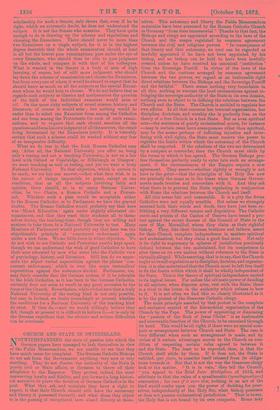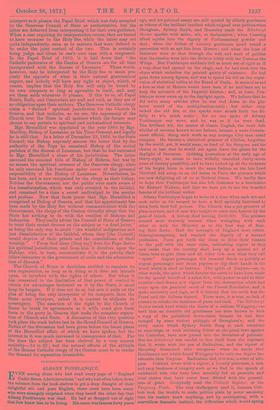CHURCH AND STATE IN SWITZERLAND.
NOTWITHSTANDING the state of passion into which the German papers have managed to lash themselves in view of the Fulda Memorandum, we are unable to see that they have much cause for complaint. The German Catholic Bishops do not ask from the Government anything very new or very startling. They do not disown the authority of the State in purely civil or State affairs, or threaten to throw off their allegiance to the Emperor. They protest, indeed, the most unswerving loyalty and fidelity, and put forward a long histori- cal narrative to prove the devotion of German Catholics in the past. What they ask, and maintain they have a right to expect, is that their Church should still have the autonomy and liberty it possessed formerly, and what alone they object to is the passing of exceptional laws aimed directly at them-
selves. This autonomy and liberty the Falda Memorandum maintains have been possessed by the Roman Catholic Church in Germany "from time immemorial." Thanks to that fact, the Bishops and clergy are appointed according to the laws of the Church and the usages regulated by common agreement between the civjj and religious powers. "In consequence of that liberty and that autonomy, no cure can be regarded as lawfully appointed if he have not been appointed by his bishop, and no bishop can be held to have been lawfully created unless he have received his canonical 'institution' from the Sovereign Pontiff. In virtue of the laws of the Church and the customs arranged by common agreement between the two powers, we regard as an inalienable right direct relations between the Bishops and the Sovereign Pontiff and the faithful." There seems nothing very formidable in all this, nothing to warrant the loud exclamations against in- fringing the sovereign authority of the State in its own domain, nothing even to object to in defining the relations between the Church and the State. The Church is entitled to regulate her own affairs. In all that concerns her internal organisation, her discipline, doctrines, and worship she is perfectly free, on the theory of a free Church in a free State. But as even spiritual acts—the sentences of purely ecclesiastical courts, for instance —may in certain cases have consequences other than spiritual, may be the means perhaps of inflicting injustice and inter- fering with civil rights, the State must reserve the power to regulate the limits within which the autonomy of the Church shall be respected. If the relations of the two are determined by a compact or concordat, then the Church must abide by the terms to which it has agreed. The German Bishops pro- fess themselves perfectly ready to enter into such an arrange- ment, if the circumstances of the Empire require a new agreement. They assert---whether rightly or wrongly is not here to the point—that the principles of the Holy See now are precisely the same as in the times when German Govern- ments made treaties and concordats with it. And they ask what there is to prevent the State regulating in conjunction with Rome the relations between the Church and itself.
All this seems fair and reasonable. It is a pity the Swiss Catholics were not equally sensible. But unless we strangely misread both their words and deeds, they have just been ex- hibiting a very different temper and disposition. The Catholic cures and priests of the Canton of Geneva have issued a pro- test against the recent decrees of the Council of State in the case of Mgr. Mermillod, whom they claim as their rightful bishop. They, like their German brethren and fathers, assert for their Church complete independence in matters spiritual and ecclesiastical, but they claim a good deal more. Not only
is its right to supremacy in spheres of jurisdiction previously defined between the two maintained, but its competence to alter these on its own motion without reference to the State is virtually alleged. While asserting, that is to say, that the Church ought to be self-regulative as to discipline, doctrine, and organisa- tion, it is also maintained that the Church must be left free itself to fix the limits within which it shall be wholly independent of the State. This is the theory of spiritual independence carried to its logical issues. For unless the ultimate power of deciding in all matters, when disputes arise, rest with the State, there is a rival to the latter, in the authority which refuses to bow to it. It is not often we find this so clearly illustrated as it is by the protest of the Genovese Catholic clergy. The main principle asserted by that protest is the complete and exclusive control of the hierarchical organisation of the Church by the Pope. The power of appointing or dismissing the "pastors of the flock of Jesus Christ" is an inalienable and irrevocable function of the Church, to be exercised through its head. This would be all right, if there were no special com- pact or arrangement between Church and State. The case is very different when such an arrangement is made, and by virtue of it certain advantages accrue to the Church on con-
dition of respecting certain rules- agreed to between it and the State. The least to be expected, then, is that the
Church shall abide by them. If it does not, the State is
entitled, ipso facto, to consider itself released from its obliga- tions towards it. But that is not the way the Genevese clergy
look at the matter. "It is in vain," they tell the Council,
"you appeal to the Brief Inter Multiplices of 1819, and attribute to that the value of a synallamatic (synallarnatique) convention ; for even if it were that, nothing in an act of the
kind would confer upon you the power of deciding for your- selves, independently of the Holy See, what bishop possesses or does not possess ecclesiastical jurisdiction." That is to say, the Holy See is not bound by its own compacts. Rome may
interpret as it pleases the Papal Brief, which was duly accepted by the Genovese Council of State as authoritative, but the latter are debarred from interpreting it for their own guidance. When a case requiring its interpretation occurs, they are bound to have recourse to the Holy See, while the latter may act quite independently, even as to matters that were defined to be under the joint control of the two. This is certainly being judge and client in one's own case with a vengeance. In the Papal Brief of 1819, it is laid down that "the Catholic pastorates of the Canton of Geneva are for all time incorporated with the diocese of Lausanne." These words, however, may be interpreted by the Holy See to mean pre- cisely the opposite of what is their natural grammatical import, and nobody will have any right to object, which, of course, implies that the Holy See will only be bound by its own compacts so long as agreeable to itself, and may set them aside whenever it pleases. If this be so, all Papal Briefs, Bulls, and Concordats are null and void, as they are of no obligation-upon their authors. The Genovese Catholic clergy claim a " distinct " spiritual jurisdiction for the Church in Geneva, and that includes, as we see, the supremacy of the Church over the State in all matters which the former may choose to say pertain to spiritual and ecclesiastical interests.
Mgr. Mermillod was appointed in the year 1864 by Mgr. Marilley, Bishop of Lausanne, as his Vicar-General, and legally he is still that. In a letter of December 22, 1864, to the State Council, the Bishop expressly assures the latter that by the authority of the Pope he remained Bishop of the united parishes of the diocese of Lausanne, but that he had entrusted to Mgr. Mermillod a share of his jurisdiction. The latter assumed the nominal title of Bishop of Hebron, but was by no means the spiritual overseer of the Genevese clergy, since he only exercised his functions under cover of the personal responsibility of the Bishop of Lausanne. Nevertheless, he has been, and is now recognised by the clergy as their bishop. Neither the Government nor the public were made aware of the transformation, which was only revealed to the faithful, and remained for a time a secret undivnlged to the secular and profane. Now that facts prove that Mgr. Mermillod is recognised as Bishop of Geneva, and that his appointment has been made by the Holy See without communication with the Government, the clergy of the Canton virtually allege that the State has nothing to do with the creation of bishops and bishoprics. They coolly advise the Council of State of Geneva to treat their recent decrees on the subject as "a dead letter," as being the only way to avoid "the wrathful indignation -and just dissatisfaction of the faithful, whom they [the Council] would deprive of their priests and the consolations of their worship." f' From God alone [they say] does the Pope derive his spiritual jurisdiction, and from him it devolves upon the Bishops, who, in turn, communicate it to the priests, their fellow-labourers in the government of souls and the adminstra- tion of -dioceses."
The Church of Rome is doubtless entitled to regulate its own organisation, so long as in doing so it does not intrude upon, or interfere with, the rights of others. But when it has consented to the limitation of that power of control in return for advantages bestowed on it by the State, it must keep its bargain. If it does not do so, but sets it aside on the plea of being the only interpreter of its compacts, then the State must interpose, unless it is content to abdicate its sovereignty. The assertion of the right by the Church of Rome to break its agreements as it wills, must give fresh force to the party in Geneva that seeks the complete separa- tion of Church and State. A discussion of this very question took place the week before last in the Grand Council of Geneva. Notice of the discussion had been given before the latest phase of the Mermillod affair, of which we have spoken, but the interest in it was much increased in consequence of that. For the time the subject has been shelved by a very narrow majority-34 to 32; but the natural effects of the attitude of the Roman Catholic clergy of the Canton must be to render the demand for separation irresistible.



































 Previous page
Previous page